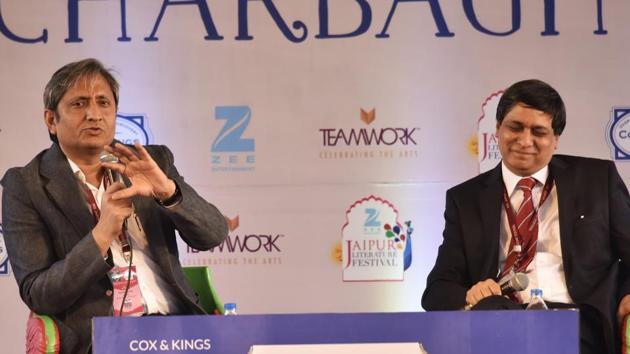Was Akbar progressive? Ravish Kumar asks novelist Shazi Zaman at JLF 2017
Visitors to the Jaipur Literature Festival were treated to an enlightening discussion between journalist Ravish Kumar and Shazi Zaman, author of the Hindi novel Akbar. Zaman, who has been working on the book for 20 years, said his novel is rooted in historical fact and research.
A fascinating portrait of Mughal emperor Akbar emerged at this year’s Jaipur Literature Festival. The crowd listened avidly as journalist Ravish Kumar and writer Shazi Zaman discussed the latter’s Hindi novel Akbar.

At the outset, Ravish said he wanted to finish the book before the session and “not cheat the audience”. Chatting with Zaman in his trademark style, peppered with commentary and asides (at one point, while reading out a description Akbar’s eyes, he broke into Yeh kali kali aankhein), Ravish asked him how much of the novel was fact, and how much fiction.
Zaman, who has been working on the book for 20 years, said the novel is rooted in historical fact and research. “But how these events affected the king’s feelings and thoughts is my imagination,” he said. The crux of the novel is about Akbar’s inner wrangling, his restlessness with matters of faith and spirituality. Zaman cited many passages from his novel as examples of the emperor’s respect not only for other religions, but also for differing opinions. “When Man Singh, who Akbar was very close to, told him that he could not understand Din e Ilahi, a new order founded by the king, Akbar never broached the subject again,” said Zaman.
Watch: In conversation with Shazi Zaman, author of Akbar, and journalist Ravish Kumar
For Ravish, one of the pressing questions was whether the Mughal king was progressive and tolerant -- something that today’s rulers need to embody? “At Fatehpur Sikri, a charpai was dragged to the door of the royal chamber so that Akbar could converse with Brahmans, sufis and others,” said Zaman.

This spirit of respecting all ideas and streams of thought emerged as one of the biggest takeaways from this session. At a time when efforts are being made to erase the history of Mughals, Zaman feels Akbar survives as an idea of eclecticism.
Talking to HT later, Ravish said, “When you go through the novel, you understand present day India more than the India of 400 years ago. Just like Akbar’s quest, a lot of people are searching why people are fighting over religion.”
Historical accounts have recorded Akbar saying some controversial things, which would offend believers even today. An account in the Dalpat Vilas, a fragment of an anonymous manuscript, recounts how the emperor once declared that Muslims should eat pigs and Hindus should eat cows. This willingness to push the envelope rattled many people, said Zaman. “Akbar used to employ the words aqal and naqal. Bynaqal, he meant those traditions that we inherit and accept without question. Akbar always said that we should employaqal, even when looking at deen, or religion,” explained Zaman.
Click here for our full coverage of the Jaipur Literature Festival 2017
Follow @htlifeandstyle for more




